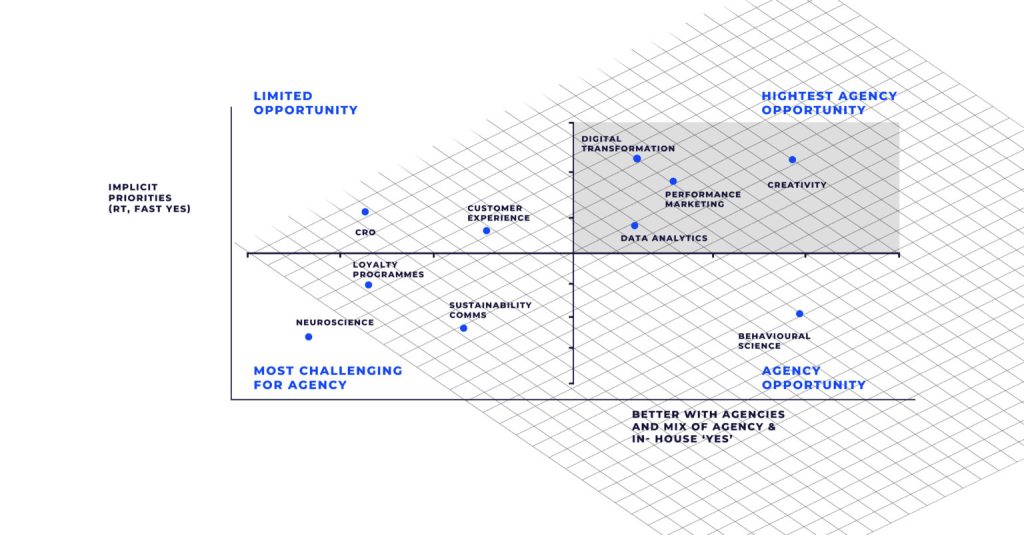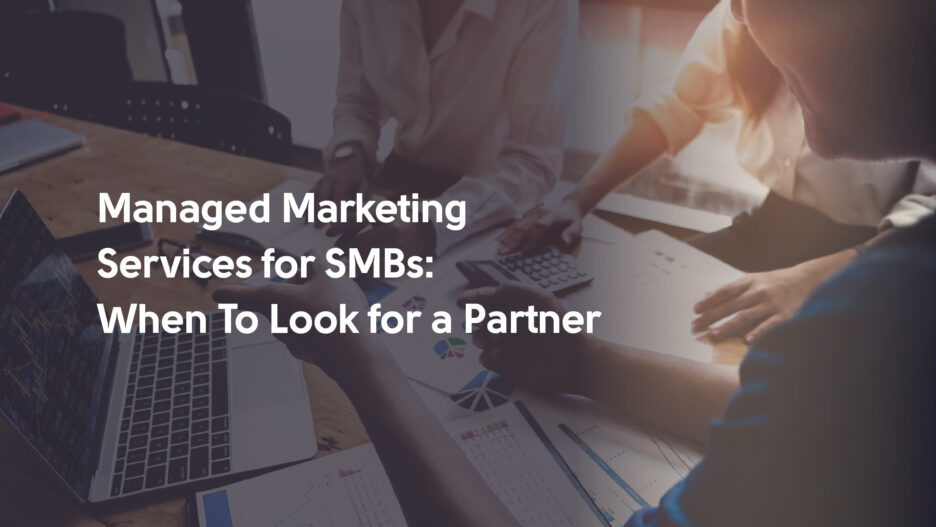In a perfect world, good marketing brings more business leads, higher customer retention, and revenue. However, that’s not always the case for small to medium businesses (SMBs). Lack of cross-functional expertise, high competition, and limited budgets contribute to 65% of businesses not seeing good ROI from digital marketing.
If your in-house team lacks the capacity and capability to deliver strong results, while agency partners perform marginally better, it may be time to consider a partnership with a managed marketing service provider.
What are Managed Marketing Services?
Managed marketing services (MMS) are a suite of integrated, end-to-end services with a flexible, cost-effective delivery model. Unlike traditional marketing services, often procured ad-hoc for a specific project, MMSs involve deeper vendor integration into all externalized business processes tied to marketing. Effectively, this model borrows the principles of managed service partnerships in IT and adapts them to marketing processes.
MMS vendors have cross-domain expertise and can provide end-to-end capabilities in:
- Creative production
- Media and advertising services
- Customer experience strategy (CX)
- Loyalty program management
- Marketing data analytics
For example, the same managed services marketing vendor can support an ecommerce brand with customer experience strategy development, managed email marketing services, content marketing, search engine optimization (SEO), and paid media campaigns.
Apart from providing SMBs with the necessary marketing competencies, MMS vendors also offer their customers access to proprietary technology. For example, a custom influencer marketing platform for campaign management or a suite of big data analytics tools for digital marketing. Accenture offers its marketing clients access to an AI-powered content advisor, dynamic content optimization (DCO) solution, and a suite of advanced personalization tools.
What Marketing Services are Best to Get From an MMS?
Unlike traditional marketing agencies, managed marketing services partners can cover a wider scope of work. Although some partners may have a niche specialization (e.g., performance marketing or creative media production), the majority usually provides a range of tailored services, ranging from marketing technology implementation and management to data analytics to content production and management.
Data from Unlimited Group suggests that 68% of brand leaders prefer creativity-related processes to be handled by an agency or a mix of agency and in-house teams. Likewise, businesses are more inclined to farm out performance marketing, data analytics, and digital transformation to partners.

Source: Unlimited Group
Managed Marketing Services vs. In-house Teams vs Marketing Agencies: What's the Difference?
The main differences between using an MMS, a traditional marketing agency, and building in-house teams lie in their level of integration, scalability, flexibility, and cost structure.
In-house marketing teams have the deepest alignment with the company’s goals and processes. They design and implement the strategy and handle its execution, either fully or partially. For SMBs, maintaining a large marketing team in-house is challenging due to high overhead costs and limited talent supply. Over three-quarters of businesses report ‘some’ or ‘high’ scarcity of marketing talent in their organization, especially in data and analytics, retail media, and ad measurement.
Marketing agencies allow SMBs to obtain specialized capabilities on a project basis like support with SEO or social media content production and management. The engagements are mostly flexible and tightly-scoped. The price ranges vary a lot and so does the quality of services. Agencies offer a great way to scale ongoing marketing initiatives or support temporary projects (e.g., seasonal campaigns).
Agency partners have a limited understanding of the company’s core business, brand, and marketing goals due to information asymmetry or poor collaboration management. A SetUp survey found that 53% of clients were dissatisfied with their agency partner due to “obtained value”, “quality of delivery”, and “changes in agency personnel.”
Managed marketing services providers offer a solid middle ground between in-house teams and agencies, providing tailored support without the full cost and commitment of retraining internal staff. Unlike agencies, which mostly do project-based work, MMSs can take over the entire business function (e.g., full-cycle digital marketing operations), acting as an extension of your in-house capabilities.
They aim to provide consistent, scalable marketing support while allowing businesses to access missing competencies and technology with flexible financial commitment. Most arrangements can be subscription or retainer-based, offering the option to customize the levels of services. For companies without the resources or desire to build a full in-house marketing department, MMSs are often the best option.
Summary of the Differences
| MMS | In-house team | Marketing agency | |
| Integration | High Embeds into the externalized marketing processes and maintains close strategic alignment | High Holds the most institutional knowledge and guides the marketing strategy | Moderate to Limited Degree of integration is subject to the agency’s maturity in client account management and the types of available services |
| Scalability | High Vendor can supply extra resources on-demand to support larger initiatives | Limited Hiring cycles may be long due to constrained talent supply or limited salary budgets | Moderate Agencies assign extra staff to an account on demand or offer ancillary services |
| Flexibility | High Scope of engagement can be negotiated and adjusted | Moderate Resources can be re-allocated to other initiatives on certain occasions | Moderate Service scope and delivery adjustments are possible to an extent |
| Cost agility | High Offers tailored services to match client budgets and needs | Low Assumes ongoing overhead, fixed, and variable costs | Moderate Possibility to negotiate service pricing and packages to a certain extent |
Benefits of Managed Marketing Services
Managed marketing services providers offer ongoing, end-to-end support, level-set with your current business goals. Thanks to a deeper integration into your business, partnerships with MSSs result in:
- Access to missing expertise: You can gain access to a diverse bench of marketing professionals, ranging from senior marketing leaders to offer strategic support to skilled, niche professionals, specializing in the requested area of marketing.
- Cost-efficiency: SMBs cannot retain a large bench of staff for multi-channel campaign execution due to budgetary constraints. An MMS offers flexible access to talent, while shouldering overhead expenses like recruitment fees, training, or equipment purchases.
- Predictability: MMSs typically provide a master service level (MSA) that establishes the scope of purchased services, mutual obligations, billing arrangements, and performance KPIs. Clients have full transparency into the service levels they receive.
- Scalability: Service levels (including deliverables, team headcount, and degree of engagement) can be flexibly adjusted to better match your business dynamics.
- Access to technologies: The best vendors also offer access to proprietary or AdTech-partner-supplied technologies to promote process automation, marketing measurement, or campaign personalization levels.
- Low management overheads: Commissioning integrated services reduces the complexity of coordinating multiple external service providers, leaving your leadership team with more time for strategic action, rather than project management.
When SMBs Should Opt for Managed Marketing Services
Partnering with a managed marketing service manager provider makes the most sense when you lack acumen in-house, struggle to deliver consistent results, and seek cost efficiency, extra flexibility, and innovation.
Limited In-House Expertise
One in seven marketing leaders say that their internal team's capability is one of the biggest challenges they’re facing. In particular, leaders wish to have:
- Better access to fresh and innovative creative ideas (45%)
- Ability to deliver faster results (45%)
- Extra skills beyond the current capabilities (43%)
- Access to more insightful consumer messaging (42%)
- Access to sector-specialist knowledge (39%)
The typical marketing team headcount at a small business (under 100 employees) is under five people. In many cases, such teams mostly have generalists, who need to wear multiple hats to keep the function running.
Partnerships with MMS enable flexible access to specialized roles, skill sets, and industry expertise. For example, you can acquire greater support for social media marketing, which would include full-cycle content production, paid advertising, influencer marketing, and social listening without hiring 3 to 5 extra people in-house. Managed marketing services providers have deeper expertise with a range of strategic issues and can thus contribute more effectively than a junior hire or a generalist marketer.
Budgetary Constraints
Limited in-house headcount also means that your team is stretched thin during busy periods and cannot keep all the plates spinning. However, you’re struggling to get more people on board due to the limited budget.
The average content marketing manager's salary is $111,352. That is excluding extra overheads like sign-on bonuses, employer taxes, ongoing training, and equipment costs. The average salary of an SEO manager is $80,310 while having a social media manager would cost another $90,940 per year. In other words, a three-person marketing team can set you back over $300K annually in payroll costs alone.
Partnership with an MMS can be more cost-effective since you can retain certain people in a fractional capacity while paying a fixed monthly retainer for a scoped set of deliverables. Most vendors can also dynamically adapt service levels to better accommodate the ebbs and flows in your business cycle.
High-Growth Stage
On the other hand, you may have the budget to accelerate your marketing, for example as you expand to the new market or plan a new product release. Your in-house team, however, cannot fully accommodate the increased scope of work. Given that the average time-to-hire for a marketing role is 40 days, you risk missing out on the opportunities if you only hire in-house.
MMS can extend your team on shorter notice and take over a variety of core or ancillary marketing processes to help you hit growth-oriented KPIs. This allows SMBS to level-set their capabilities with those of bigger competitors but at a much lower cost.
Unsatisfactory Marketing ROI
Revenue and marketing are connected at the hip. Lack of strategy and/or mediocre execution negatively affects sales figures. Likewise, your current results may not tell the full picture if your team struggles with accurate campaign attribution, measurement, and analytics.
In fact, 64% of B2B marketing leaders don’t trust their organization’s marketing measurement for decision-making. In some cases, it may be a poor selection of metrics (e.g., focusing on sourcing metrics like pipeline or revenue to demonstrate ROI), rather than tracking more telling options like average customer lifetime value (CLV) or average customer acquisition cost (CAC). In others — lack of data analytics tools and big data analytics expertise is the primary problem.
Since most managed service agreements are pegged to specific metrics, your partner will be able to help you select the optimal marketing metrics to track for different campaign types and help implement appropriate reporting dashboards. So that you could always provide accurate results to other business stakeholders and clearly articulate the correlation between marketing spending and delivered outcomes.
Innovative Marketing Strategies
The “rules of play” in marketing evolve fast. What used to be a “proven best practices” or “sure-fire growth hack” in the industry a year ago may no longer work. Frequent Google algorithm changes re-wired SEO tactics. The rising costs of pay-per-lead (up by 20% this year!), paired with increased usage of ad blockers and a greater focus on user data privacy among Big Tech firms, also diminishes the returns.
Managed marketing services providers keep close tabs on marketing landscape evolution and can suggest more innovative (and result-driven) strategies for businesses. According to a 2024 survey by ICG, 34% of companies would like to get more insights into marketing trends, 39% — into content and messaging, and 32% — into social media advertising. These are the areas where MMSs are well-equipped to help.
Tips for Partnering with a Managed Marketing Services Provider
Hiring an MMS is a big step. You want your partner to have both the rising expertise and “chemistry” with your business — that is to understand your product(s), business model, market positioning, and branding preferences.
To find the right fit, due your due diligence. Look for companies with expertise in your market vertical. Check reviews and past case studies to understand what sort of results to expect. Then reach out for a discovery call to talk about their approach and receive a preliminary partnership proposal.
To get the best results, try the following:
- Be upfront about your expectations: Explain your goals and outline the current strategy. Be candid about your results so far, as well as any constraints you’re facing (e.g., in terms of budget or team headcount). Transparency helps the MMS better evaluate your strengths and weaknesses and then suggest a tailored strategy for collaboration.
- Check for culture fit. Ask the vendor to talk about their collaboration processes, team expertise, and past results. Do ask about how they approach integration with their partners and what’s expected at your end to make that happen. Look for a provider that can match the style and speed of doing business at your organization to ensure a good fit with your in-house team.
- Evaluate their scope of service and technology stack: Some partners have stronger functional expertise in certain areas (e.g., digital PR and social media, over lead generation). Larger entities may offer a wide range of services but for a higher price tag. Likewise, ask about the technology they’re employing. The best companies rely on a wide range of MarTech tools for workflow automation, analytics, customer analytics, and more.
- Start with a trial period. Consider kicking things off with a short-term engagement or specific project to better understand the partner’s approach to communication, service delivery, and reporting. Seek out a strategic partner — such that deeply understands your goals, market landscape, and target audiences and translates this knowledge into tailored strategies and collaborative work.
Conclusion
Managed services model helps SMBs gain greater marketing support without confronting the tough realities of hiring, training, and retaining larger in-house teams or struggling to align expectations with a traditional agency partner.
It is an excellent “middle-ground” for growth-driven startups and SMBs looking for a combination of cost agility, rapid scalability, and access to innovative tactics and technologies.





